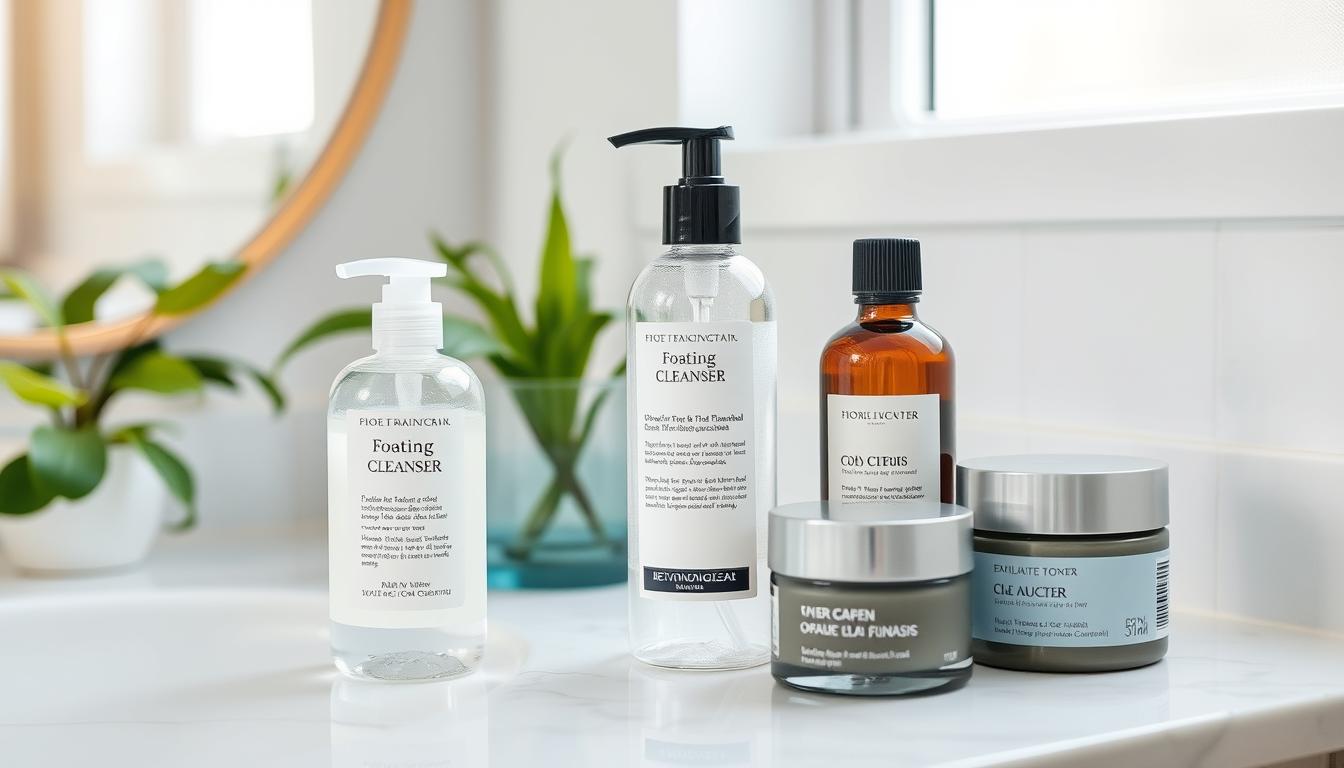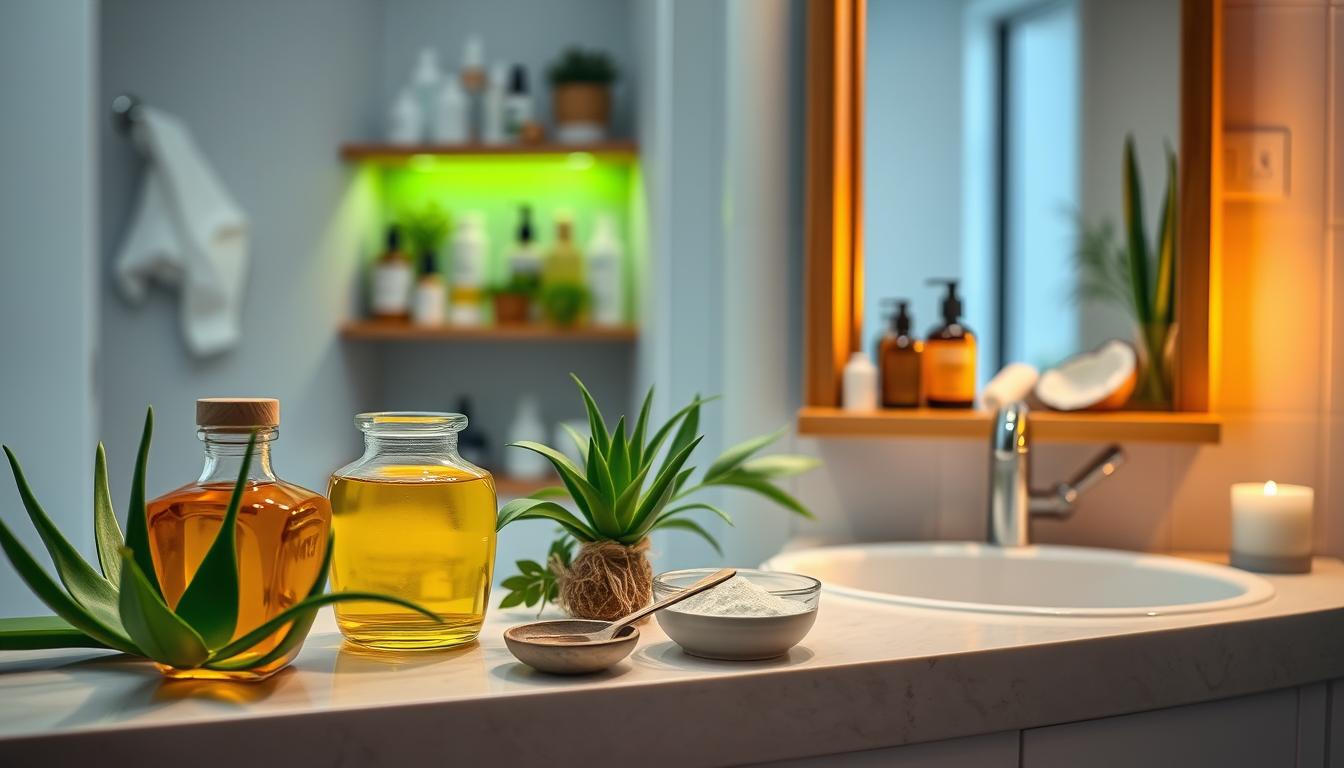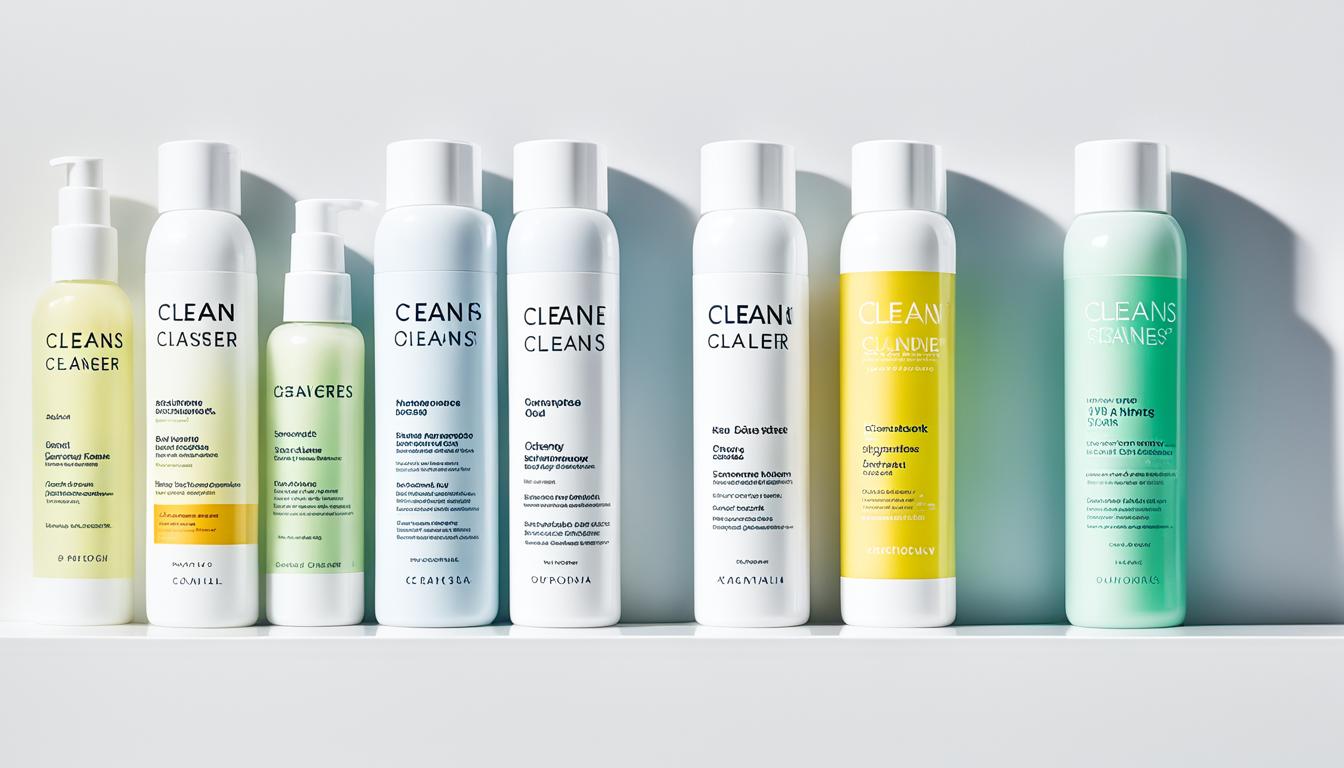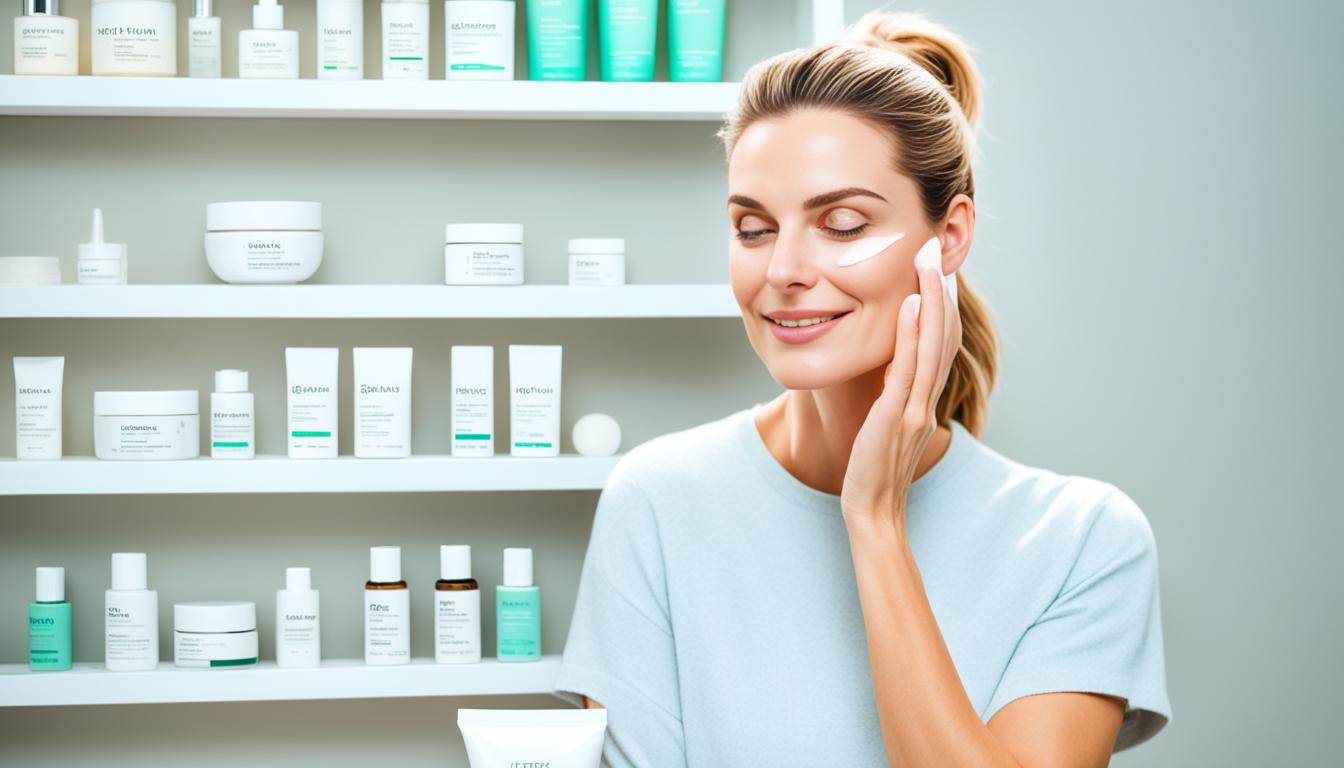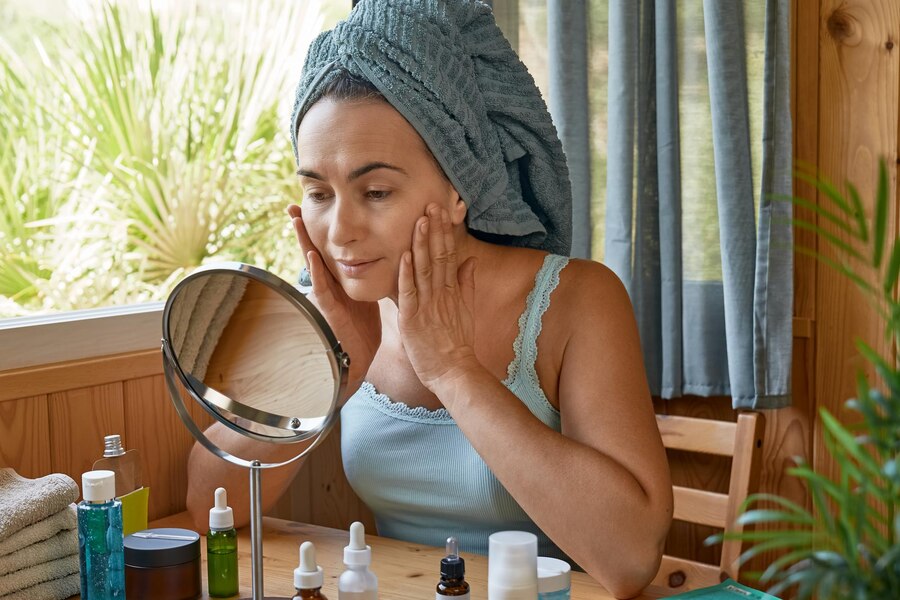10 Easy DIY Fixes For Dry Skin At Home

Dry skin can be a common issue, but you don’t always need to rely on store-bought products to find relief. There are plenty of easy, do-it-yourself remedies that can help nourish and rejuvenate your skin. By using natural ingredients that you likely already have at home, you can effectively treat dry skin without breaking the bank or exposing your skin to unnecessary chemicals. In this article, we’ll explore 10 easy DIY fixes for dry skin at home that are both effective and affordable.
Key Takeaways:
- DIY remedies can provide effective and affordable solutions for dry skin.
- Natural remedies use simple ingredients that nourish and soothe the skin.
- Using DIY remedies allows for more control over the ingredients used.
- Natural oils like coconut oil and aloe vera gel can help replenish moisture in the skin.
- Establishing a skincare routine is crucial for managing dry skin.
Why Opt for a Natural Dry-Skin Remedy Rather Than Buy a Product?
When it comes to treating dry skin, opting for a natural remedy can be a great choice. Commercial products often contain a long list of ingredients, including preservatives, alcohol, and fragrances, which can contribute to skin irritation and dryness. On the other hand, natural remedies use simple, natural ingredients that can nourish and soothe the skin without any added chemicals. By choosing DIY remedies, you have more control over the ingredients and can tailor the remedy to your specific needs.
Also Read : 10 Unexpected Reasons For Dry Skin
With natural dry-skin remedies, you can avoid potentially harmful ingredients and choose ingredients that are known for their moisturizing and healing properties. For example, coconut oil, a popular dry-skin remedy, is rich in fatty acids that help lock in moisture and keep the skin hydrated. Aloe vera gel, another common natural remedy, has soothing properties that can relieve dryness and irritation.
Also Read : How Often To Wash Your Hair?
Furthermore, when you opt for dry-skin remedies you can DIY at home, you can save money and reduce waste. Many natural remedies use ingredients that you may already have in your kitchen or pantry, making them accessible and cost-effective. By avoiding the need for excessive packaging and transportation, you can also contribute to a more sustainable lifestyle.
Also Read : Best Beard Care Kit: Grooming Essentials Ranked
By choosing natural dry-skin remedies, you can nurture your skin with gentle, wholesome ingredients and customize your skincare routine to meet your specific needs.
In addition to the benefits for your skin and the environment, using natural remedies can also provide a sense of empowerment and self-care. Creating your own skincare products allows you to take control of your beauty routine and engage in a therapeutic, creative process. It’s a wonderful way to connect with your skin and explore the healing power of nature.
Also Read : Lumin Skin Care for Men: Grooming Essentials
So, the next time you’re faced with dry skin, consider turning to remedies you can DIY. Embrace the power of natural ingredients, enjoy the satisfaction of creating your own products, and give your skin the nourishment it deserves.
Also Read : Revitalize Your Glow: Best Skin Care Routine for 40s
How Natural Remedies Can Soothe Dry, Irritated Skin
Natural remedies can be incredibly effective in soothing dry and irritated skin. Your skin naturally produces oil to protect it from moisture loss, but everyday activities like not moisturizing enough or using drying soaps can strip away these natural oils. By using natural oils like coconut oil and aloe vera gel, you can replenish the skin’s moisture barrier and provide relief from dryness and irritation. These remedies can also help remove dead skin cells and promote healthier, smoother skin.
10 Natural DIY Remedies to Moisturize Dry Skin
Dry skin can be a troublesome condition, but the good news is that you can easily moisturize and nourish it using simple and natural ingredients found in your own kitchen. Here are 10 effective DIY remedies that will help revive your dry skin:
1. Whipped Olive Oil Moisturizer
Key ingredients: whipped olive oil, vitamin E, antioxidants
Create a luxurious whipped olive oil moisturizer by combining olive oil with a few drops of vitamin E oil. Whip the mixture until it reaches a light and fluffy consistency. Apply it to your skin, focusing on dry areas, for a deeply nourishing treatment.
2. Avocado Mask
Key ingredients: avocado, antioxidants, probiotics
Mash a ripe avocado and apply it to your face as a mask. Avocado is rich in antioxidants and probiotics, which help hydrate and nourish the skin. Leave the mask on for 15-20 minutes before rinsing it off with warm water.
3. Coconut Oil Sugar Scrub
Key ingredients: coconut oil, sugar
Create a gentle exfoliating scrub by mixing coconut oil with sugar. The sugar gently removes dead skin cells while the coconut oil moisturizes and hydrates. Massage the scrub onto your skin in circular motions, then rinse thoroughly.
4. Oatmeal Soak
Key ingredient: oatmeal
Add a cup of oatmeal to your bathwater and soak in it for 15-20 minutes. Oatmeal has natural properties that soothe and rehydrate dry skin, leaving it soft and supple.
5. Oatmeal Honey Mask
Key ingredients: oatmeal, honey
Mix oatmeal and honey to create a moisturizing and exfoliating mask. The oatmeal gently removes dead skin cells while the honey provides moisture and soothes irritation. Apply the mask to your face, leave it on for 10-15 minutes, then rinse off with warm water.
These DIY remedies are easy to make and can provide significant relief from dry skin. Incorporate them into your skincare routine regularly for hydrated and healthy-looking skin.
6. Other Natural Remedies to Consider
“Nature gives you the face you have at twenty, but it’s up to you to merit the face you have at fifty.” – Coco Chanel
In addition to the remedies mentioned above, other natural ingredients that can be beneficial for moisturizing dry skin include honey, shea butter, almond oil, and jojoba oil. These ingredients are known for their hydrating and nourishing properties, making them excellent choices for combating dryness.
7. Keep Your Skin Hydrated from the Inside Out
Remember, moisturizing dry skin is not just about what you apply topically but also about what you consume. Make sure to drink an adequate amount of water throughout the day to keep your skin hydrated from within. Hydrated skin is less prone to dryness and will appear healthier and more vibrant.
8. Customize Your Remedies
Feel free to experiment with these natural remedies and adjust them to suit your skin’s specific needs. Everyone’s skin is unique, so what works for someone else may not necessarily work for you. Pay attention to how your skin reacts to different ingredients and adjust accordingly.
9. Seek Professional Advice if Needed
If your dry skin persists or worsens despite trying DIY remedies, consider consulting a dermatologist or skincare professional. They can provide personalized recommendations based on your specific skin type and condition.
10. Consistency is Key
Lastly, consistency is key when it comes to moisturizing dry skin. Incorporate these DIY remedies into your skincare routine consistently to see long-term improvements. Remember, healthy and hydrated skin takes time and effort to achieve.
Benefits of Using Natural Oils for Dry Skin
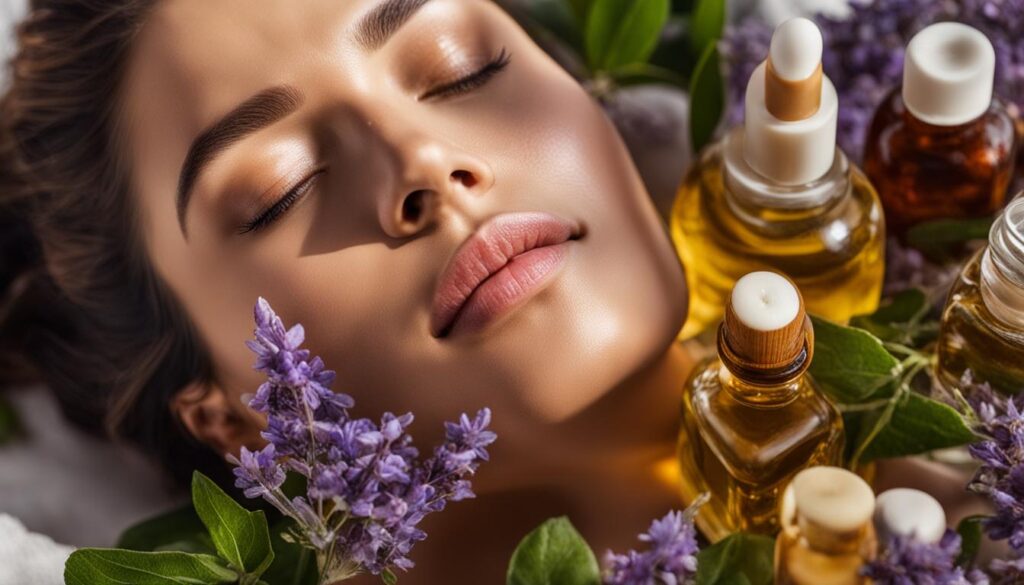
Natural oils can be a game-changer when it comes to treating dry skin. They offer a range of benefits, from hydration to nourishment, that can help restore and rejuvenate your skin. Here are some key natural oils that are particularly effective for dry skin:
Coconut Oil:
Coconut oil is a popular choice for dry skin as it is deeply hydrating and suitable for most skin types. It contains natural fatty acids that help to nourish and moisturize the skin, leaving it soft and supple.
Olive Oil:
Olive oil is not just a kitchen staple; it’s also a fantastic moisturizer for dry skin. Rich in antioxidants and vitamin E, olive oil helps to repair damaged skin and improve its overall health. It has a lightweight texture that absorbs easily, leaving your skin feeling smooth and refreshed.
Castor Oil:
Castor oil is a thick and luxurious oil that can provide intense hydration to dry skin. It is especially beneficial for areas of the body that are prone to dryness, such as elbows, knees, and heels. Castor oil helps to lock in moisture, preventing water loss and keeping your skin moisturized for longer periods.
Lavender Oil:
Lavender oil not only has a calming aroma but also offers great benefits for dry skin. It has soothing properties that help to alleviate redness and irritation, making it an excellent choice for sensitive or inflamed skin. Additionally, lavender oil promotes cell regeneration, helping to rejuvenate and revitalize dry skin.
Avocado Oil:
Avocado oil is packed with essential fatty acids, vitamins, and antioxidants that are highly beneficial for dry skin. It helps to nourish and replenish the skin, restoring its natural moisture balance. Avocado oil also has anti-inflammatory properties, making it suitable for relieving dry, itchy skin conditions like eczema and psoriasis.
By incorporating natural oils into your skincare routine, you can provide your skin with the hydration and nourishment it needs to thrive. Whether you choose coconut oil, olive oil, castor oil, lavender oil, or avocado oil, these natural remedies can help repair, restore, and maintain healthy, moisturized skin.
Tips for Preventing and Managing Dry Skin

In addition to using DIY remedies, there are several tips you can follow to prevent and manage dry skin. By incorporating these practices into your routine, you can maintain healthy and hydrated skin and minimize the occurrence of dryness.
- Moisturize dry skin: Regularly moisturizing your skin is key, especially after bathing or washing your hands. Choose a moisturizer that is suitable for your skin type and contains hydrating ingredients like hyaluronic acid or glycerin.
- Protect your skin: It’s important to protect your skin from harsh environmental factors that can contribute to dryness. Wear gloves when doing household chores or working outdoors to shield your skin from drying agents and irritants.
- Avoid harsh soaps: Harsh soaps and cleansers can strip away the natural oils from your skin, leading to dryness. Opt for gentle, fragrance-free cleansers that are specifically formulated for dry or sensitive skin.
- Adjust shower temperature: Hot water can further dehydrate your skin and strip away its natural oils. Instead, opt for lukewarm water when showering or washing your face to help retain moisture.
- Wear gloves: When the weather is cold and dry, wearing gloves can help protect your hands from the elements. This can prevent moisture loss and maintain the hydration of your skin.
By following these tips, you can effectively prevent and manage dry skin, keeping your skin healthy, nourished, and hydrated.
The Importance of a Skincare Routine for Dry Skin

Establishing a skincare routine is crucial for managing dry skin. By following a consistent and personalized routine, you can effectively address dryness and promote overall skin health. Your skincare routine should encompass gentle cleansing, exfoliation, moisturization, and protection.
Gentle Cleansing
When it comes to dry skin on the face, it’s important to use mild cleansers that won’t strip away the skin’s natural oils. Look for cleansers with hydrating and soothing ingredients such as hyaluronic acid, glycerin, or ceramides. Avoid harsh soaps or cleansers that contain alcohol or fragrances, as they can further dry out the skin.
Exfoliation
Exfoliation is an essential step in any skincare routine, as it helps remove dead skin cells and promotes cell turnover. However, for dry skin, it’s important to choose gentle exfoliators that won’t cause irritation or dryness. Look for exfoliators with ingredients like jojoba beads, fruit enzymes, or gentle acids such as lactic acid or mandelic acid. Exfoliate your skin 1-2 times a week to maintain a smooth and radiant complexion.
Moisturization
Moisturization plays a key role in hydrating dry skin. After cleansing and exfoliating, apply a hydrating moisturizer that is specifically formulated for dry skin. Look for moisturizers that contain ingredients like hyaluronic acid, ceramides, shea butter, or squalane. These ingredients help to lock in moisture and replenish the skin’s natural barrier. Apply moisturizer morning and night to keep your skin hydrated throughout the day.
Protection
Protecting your skin from harsh external factors is essential for managing dry skin. Shield your skin from sun exposure by applying a broad-spectrum sunscreen with at least SPF 30. Additionally, extreme temperatures and wind can further dehydrate the skin, so it’s important to cover up with protective clothing and avoid spending prolonged periods of time outdoors in harsh weather conditions.
By incorporating a skincare routine that includes gentle cleansing, exfoliation, moisturization, and protection into your daily regimen, you can effectively address dry skin and promote a healthier and more hydrated complexion.
When to Seek Professional Help for Dry Skin

While DIY remedies can be effective for most cases of dry skin, it’s important to know when it’s time to seek professional help. If you have chronic skin conditions like rosacea, psoriasis, or cystic acne, it’s recommended to consult with an aesthetician or dermatologist. These professionals can provide personalized advice and treatment options tailored to your specific skin condition. If you’re unsure about the severity or underlying cause of your dry skin, it’s always best to consult a professional for an accurate diagnosis and appropriate treatment.
Seeking professional help for chronic skin conditions ensures that you receive the necessary expertise to manage and treat your skin effectively. Aesthetician and dermatologist consultations are particularly beneficial because they bring advanced knowledge and experience in dealing with various skin issues. They use their expertise to assess the condition of your skin, identify any underlying causes, and develop an appropriate treatment plan. Their specialized knowledge allows them to prescribe medications, recommend specific skincare products, and perform advanced treatments that can significantly improve your skin’s health.
Consulting with a professional is especially crucial if your dry skin is accompanied by persistent symptoms such as severe itching, redness, inflammation, or pain. These signs could indicate an underlying skin condition that requires specialized intervention. Additionally, if your DIY remedies have not been effective in managing your dry skin or if your condition worsens over time, it’s essential to seek professional help to prevent further complications.
Benefits of Consulting an Aesthetician
An aesthetician is a skincare professional trained in providing a range of non-medical treatments to improve the overall appearance and health of the skin. Consulting an aesthetician for your dry skin concerns can offer several benefits:
- Personalized Assessment: An aesthetician will examine your skin closely, discuss your concerns, and consider your medical history to understand the root causes of your dry skin.
- Tailored Treatment Plan: Based on their evaluation, the aesthetician will create a personalized treatment plan that addresses your specific needs, taking into account your skin type, condition, and lifestyle.
- Specialized Treatments: Aestheticians have access to advanced skincare treatments, such as professional-grade facials, chemical peels, microdermabrasion, and laser therapies, which can effectively combat dryness and rejuvenate the skin.
- Homecare Recommendations: They can advise you on the best skincare products and routines to maintain and enhance the results achieved through professional treatments.
By consulting with an aesthetician, you can benefit from their expertise and tailored approach to achieve hydrated, healthy, and radiant skin.
Benefits of Consulting a Dermatologist
A dermatologist is a medical doctor specializing in diagnosing and treating various skin conditions. Seeking a dermatologist’s expertise for your dry skin can provide several advantages:
- Accurate Diagnosis: Dermatologists can accurately diagnose the underlying cause of your dry skin by conducting thorough examinations, taking into account your medical history, and performing any necessary tests.
- Prescription Medications: If your dry skin is related to an underlying medical condition, a dermatologist can prescribe medications, such as topical creams, ointments, or oral medications, to alleviate symptoms and treat the root cause effectively.
- Advanced Treatments: Dermatologists are trained in performing specialized procedures like skin biopsies, cryotherapy, and injectable treatments, which may be necessary for severe or complicated cases of dry skin.
- Continued Monitoring: A dermatologist can provide ongoing monitoring of your skin condition, ensuring that your treatment plan remains effective and making any necessary adjustments as needed.
By consulting with a dermatologist, you can access comprehensive medical expertise and receive appropriate treatment for chronic or severe dry skin conditions.
| When to Consult an Aesthetician | When to Consult a Dermatologist |
|---|---|
| If your dry skin is not caused by an underlying medical condition | If your dry skin is accompanied by symptoms like severe itching, redness, inflammation, or pain |
| If you prefer non-medical, non-invasive treatments | If you suspect an underlying skin condition such as rosacea, psoriasis, or cystic acne |
| If you want personalized skincare advice and treatments tailored to your specific needs | If your dry skin does not improve with DIY remedies or over-the-counter treatments |
Ultimately, the decision to consult an aesthetician or dermatologist depends on the nature and severity of your dry skin symptoms. It’s important to remember that these professionals have the knowledge and expertise to provide the most appropriate care for your skin. By seeking professional help, you can optimize your treatment approach and achieve the best possible outcomes for your dry skin.
Conclusion
Dry skin can be a frustrating condition, but there are plenty of effective home remedies that can help you find relief and improve the health of your skin. By utilizing natural ingredients and incorporating a regular skincare routine, you can effectively moisturize and nourish your dry skin without relying on store-bought products.
However, it’s important to remember that if you have chronic skin conditions or if your dry skin persists despite home remedies, it may be necessary to seek professional help. Consult with an aesthetician or dermatologist who can provide personalized advice and recommend treatment options tailored to your specific needs.
Always prioritize the hydration of your skin and take steps to protect it from harsh environmental factors. Establishing a consistent skincare routine that includes gentle cleansing, exfoliation, moisturization, and protection can go a long way in managing dry skin and promoting overall skin health.
In conclusion, while home remedies can be effective in addressing dry skin, it’s essential to understand the limitations and when it’s appropriate to seek professional assistance. By taking care of your skin and implementing these natural and moisturizing remedies, you can achieve a healthier, more radiant complexion.
Also Refer : How To Use Oranges For Natural Skincare: Benefits & DIY Recipes
FAQs
Q: What are some tips for avoiding dry skin?
A: Some tips for avoiding dry skin include using a gentle cleanser, staying hydrated, using a humidifier, and avoiding long hot showers.
Q: What are some home remedies for dry skin?
A: Home remedies for dry skin include using coconut oil, oatmeal baths, honey masks, and aloe vera gel.
Q: How can I DIY at home to get rid of dry skin?
A: You can DIY at home to get rid of dry skin by creating your own moisturizing masks, using natural oils, and making exfoliating scrubs from household ingredients.
Q: What causes dry skin?
A: Dry skin can be caused by factors such as harsh soaps, hot showers, cold weather, low humidity, aging, and certain medical conditions.
Q: How can I improve skin hydration naturally?
A: You can improve skin hydration naturally by drinking plenty of water, using aloe vera gel, applying coconut oil, and using a humidifier in your home.
Q: What are some natural remedies for dry skin?
A: Natural remedies for dry skin include shea butter, olive oil, almond oil, oatmeal, and yogurt masks.
Q: How can I soothe dry skin at home?
A: You can soothe dry skin at home by taking short lukewarm showers, using a moisturizer immediately after bathing, and applying natural oils or hydrating masks.
Q: What are some DIY remedies for dry skin?
A: DIY remedies for dry skin include creating your own moisturizing creams, using natural exfoliants like sugar or coffee grounds, and applying soothing ingredients like honey or aloe vera.
Q: How long should I apply DIY remedies for dry skin?
A: It is recommended to apply DIY remedies for dry skin for about 5 to 10 minutes at a time, and then gently rinsing or patting the skin dry.
Q: What are some natural ways to help your skin and relieve dry skin?
A: Some natural ways to help your skin and relieve dry skin include maintaining a healthy diet, using gentle skin care products, avoiding harsh chemicals, and protecting the skin from harsh weather conditions.

